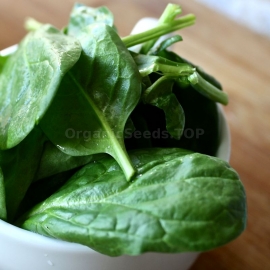



«Viking» - Organic Spinach Seeds
1.14 €
Dating back to 1933, this heirloom has large, dark green, smooth leaves with very good flavor. Delicious cooked or used in spinach salads. A high yielding variety that freezes well. A cold hardy variety that's an excellent choice for late summer/fall.
-
Heirloom Spinach «Viking»
45 days - Dating back to 1933, this heirloom has large, dark green, smooth leaves with very good flavor. Delicious cooked or used in spinach salads. A high yielding variety that freezes well. A cold hardy variety that's an excellent choice for late summer/fall maturity.How to Grow
One of the best tips for growing spinach is to make sure to plant it early in the spring. Plant spinach in the soil as soon as your garden space is ready and the soil is workable. It prefers loose, well-draining soil and will thrive in both sun and shade conditions. Spinach planting is done by planting the seeds directly outdoors, ½ inch deep. Another of the great tips for growing spinach is to plant about 12 to 15 seeds per foot of row to ensure plenty of spinach growth.
Once your plants are at least an inch or so tall, start thinning your spinach plants to about 2-4 inches apart. Also, make sure your rows are only 12 inches apart, which keeps weeds down to a minimum. Succession planting is a great method for growing spinach, planting every couple to every few weeks. This will yield fresh spinach all summer long. Because spinach is a leafy vegetable, you should always rinse the leaves before using. However, one thing about spinach planting you will love is that you don’t have to fertilize the ground before planting or during the growth phase. Spinach just doesn’t require it.
